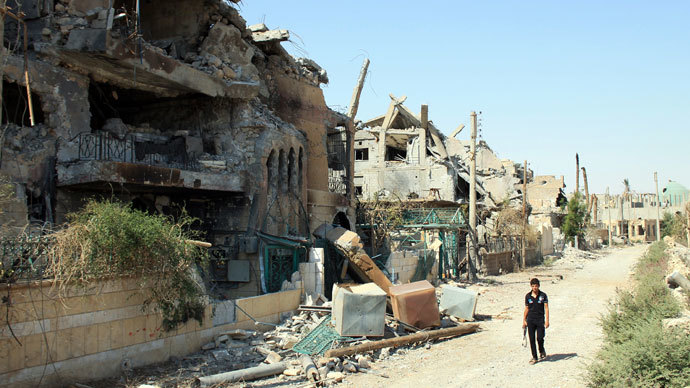US on 'slippery ground’: Taking license with R2P in Syria

Even if UN inspectors conclude that the Syrian government used chemical weapons, the decision to intervene should still lie with UN Security Council, former UN Assistant Secretary General Hans von Sponeck told RT.
It is the council that has the responsibility for R2P – ‘responsibility to protect’, in UN terms - and any other decision taken outside the Security Council would lead to violation of international law, von Sponeck, who was also a UN Humanitarian Coordinator for Iraq, added.
RT:France and Britain have agreed to wait for the UN inspectors' report on Syria, but that will only establish whether an attack took place, not who’s behind it. Will their findings make a real difference?
Hans von Sponeck: Well, I would say in the backroom the decisions have been made, but neither Washington, nor London, nor Paris, can completely ignore the “dark shadow” of the Iraq experience that hangs over the international discussion. I think the leader of the opposition of the UK House of Commons, Ed Miliband, is totally right when he says the key word in all this is “evidence.” We need evidence before we can debate what’s next, and we should not – I think it’s very dangerous – now start thinking that the Swedish chief of the UN team in Damascus, the weapons inspectors would be able to bring total transparency and clarity about this difficult question – what was used and who used it. Back to New York, I think it will take a very long time before one can venture a response to these two key questions. And if the response is that there seems to be evidence that there was the Assad’s government involvement, then I would still argue that the Security Council still has responsibility to use peaceful means or to debate this decision.

RT:Downing Street says an attack without UN Security Council consent would be justified by humanitarian reasons. The White House also says it can act without the Security Council, so why wait for it to make any decision?
HS: I think there is a complete misunderstanding about who
is responsible for the Responsibility to Protect. This
responsibility is vested in the UN Security Council, not in the
US Congress or the House of Commons, or the White House or
Whitehall [the British government administration]. I would
definitely make the case that anything outside the United Nations
Security Council on that score is getting us on a very slippery
ground and lead us down the road towards violation of
international law – the kind that we have seen in Iraq.
RT:You served as the UN Humanitarian Coordinator for Iraq. Some see similarities to the lead-up to the Iraq campaign, and the non-existent WMD 'evidence' – do you?
HS: Oh, there are parallels. There is also a very skillful
build-up here. Some weeks ago we were told, the public was told
that there may be a weapons of mass destruction that have been
used in Syria. There were likely to be such weapons involved. And
now we have very clear and critical statements by Chuck Hagel,
the Defense Secretary, and John Kerry, the Secretary of State,
who say: “We have evidence.“ Well, if they have evidence that is
better than what Colin Powell presented on February 5, 2003, to
the UN Security Council, which turned out to be totally fake
evidence, then they should go ahead and release this evidence in
the Security Council.
The statements, views and opinions expressed in this column are solely those of the author and do not necessarily represent those of RT.
The statements, views and opinions expressed in this column are solely those of the author and do not necessarily represent those of RT.












